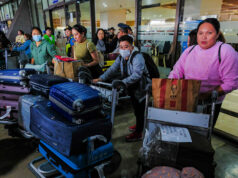When times get tough, plant a garden
By Joseph L. Garcia, Reporter
“THE whole world is aflame. All the peoples of the United Nations are fighting the savage enemies of freedom,” blared a propaganda film by Disney and the US Department of Agriculture in 1942. The title of the film? Food Will Win The War, in turn taken from a WWI slogan popularized by President Woodrow Wilson. We at home now fight a war, not against the Axis Powers as in the 1942 film, but against a virus. During times of trouble, it is wise to have easy access to food. Three ladies we talked to took it directly from the Earth (with a little bit of prodding from their green thumbs).
These three ladies, like most of us, have been spending a lot of time at home, and have converted vacant lots or rooftops into vegetable gardens. They sound a lot like victory gardens the Allies encouraged their citizens to grow during WWII: they served to reduce pressure felt from food shortages, as well as boosted morale by making people on the homefront feel they were in on the fighting too.
The ladies we talked to did it for different reasons. Based on their answers, it had a lot to do with finding themselves through the earth.
“I had my own veggie garden while I was in grade school, also at a vacant lot. It gave me a sense of purpose and accomplishment. And because neighbors would ask for whatever I had harvested, it made me proud,” said Miren Suntay. “When we moved house, gardening ended because there was no place to start a veg garden where we moved to. Also, I lost interest because, well, boys,” she said in jest. “I wanted to start gardening again about 10 years ago, after my husband passed away. But time and energy was hard to muster. Five years ago, I began. My housekeeper, a green thumb herself, had always grown ornamental plants — so we fought a lot about that. I wanted gulay too!”
“I have my garden at my property, but have also taken a portion of a vacant lot to grow most vegetables. I requested for those constructing houses in the village to dump their soil on this empty lot, instead of them having to pay to haul soil to another site. Win win!” said Ms. Suntay, who also set up a Facebook page, The BF Urban Gardeners, for her neighborhood. Her garden grows okra, eggplant, ampalaya (bitter melon), alugbati (Malabar spinach), sili (chilies), tomato, kangkong (water spinach), papaya, watermelon, basil, tarragon, peppermint, oregano, onion, garlic, stevia, blue ternate (clitoria ternatea, commonly known butterfly pea), avocado, pipinito (baby cucumber), mustard, lettuce, cucumber, ube (purple yam), chicharo (green peas), squash, melon, spinach, “and a few more.”
Susan Isorena-Arcega, PR Consultant for Manila Broadcasting Co., has a garden on her rooftop. “I love flowers, particularly hibiscus and bougainvillea. But since I got diagnosed with Stage 3 endometrial cancer last year, I decided to cultivate edibles, too,” she said.
“I already had a lush growth of ternate after a friend gave me pods when I visited Dewi Sri Farms in Pila, Laguna several years ago, and some ginseng, ashitaba, and oregano as well. But then I went into isolation because I was immuno-compromised, and rented a studio unit a street away from my family. I decided to start with the same plants on the rooftop of the apartelle where I live. It was just a laundry area, with grey cement and unfinished posts with steel jutting out, but with magnificent views of Rockwell. I wanted to add some color somehow. I had some cucumber, carrot, tomato, and lettuce seeds that I had previously bought from the hardware at Robinsons but never got to plant, so I said, well, let’s try it.”
In March, the garden got busier when the city was placed under a community quarantine and Ms. Isorena-Arcega began working from home. She heard that the Department of Agriculture — Bureau of Plant Industry was giving out seeds. “I wrote them and they gave me okra, kangkong, upo (calabash), pechay, and mustasa (Chinese cabbage, and Chinese mustard) which I planted too,” she said.
She also used recyclable materials like big water bottles as plant containers. “When my landlady saw the seedlings sprouted and tomatoes actually bore fruit, she decided to join in and had her handyman set up trellises around the rooftop. I have harvested cucumbers, pechay, kangkong, and mustasa several times already. My landlady grew alugbati, ampalaya, aloe vera, tanglad (lemon grass), kamuning (orange jessamine), and eggplant. She too has harvested. Ngayon meron na rin siyang pakwan (she now has watermelon)!”
Victoria Fritz, meanwhile, helped jumpstart a community effort up in Blue Ridge. “I started growing vegetables in our backyard when I lost my day job, just last September. So one could say that a loss brought forth a garden. I am just a beginner gardener. I have grown bushels of tomatoes, eggplants, a few bell peppers that turned out small, and healthy okras,” she said. “The ECQ gave birth to The Garden Club at Blue Ridge A, our village. I am a board member of the Blue Ridge A Homeowner’s Association, and when one resident asked for a gardening group, our board responded. It just started in June, and is mainly a support group of vegetable growers. We exchange tips, ideas and seeds, among other things. We have held two teaching webinars.” The Garden Club is a joint project of the HOA and the Blue Ridge A Barangay Council.
“Last July, we began looking into an empty lot to serve as a community garden. A Garden Club member, Eleanor, took the initiative to request seeds from the Bureau of Plant and Industry, since it is BPI’s program to offer seeds to private groups. Twelve people have signed up to volunteer. However, due to COVID-19 and the rainy weather, getting together in the community garden has been put on hold for now. Our plan is to grow a whole range of vegetables, and even ornamental plants. We plan to compost in the soil first, to create rich and healthy soil, ready for planting. Next we will plant the seeds from BPI.”
We asked the ladies for tips on planting a successful urban garden. Most of them emphasized the value of good soil. “Skill gives the edge, but soil composition can truly turn a struggling vine into the most lush (plant),” said Ms. Suntay. All of them had tips on making great compost, to use on soil to make it richer. “You need to compost food waste in the soil. Start with the fruit and vegetable trimmings, which are clean and compost most quickly. Layer the pot with soil, then food waste, put some dried leaves if you have them, and cover with soil completely. After about a month, or even less, this soil is now compost where you can grow seeds,” said Ms. Fritz. “I enrich mine further with banana peels cut into tiny bits,” offered Ms. Isorena-Arcega. She added, “Essentially, plants thrive on a lot of TLC — daily watering and pruning.”
Ms. Isorena-Arcega and Ms. Suntay both admitted to talking to their plants. They share the practice with Charles, Prince of Wales. “I happily talk to the plants and trees, and listen to them. I think it’s absolutely crucial,” he said in a BBC documentary.* Ms. Suntay said in a mix of English and Filipino, “I talk to them. I say ‘sorry’ if I need to cut or move them. I ask why they are not growing as they should — they haven’t answered. They might soon, if this pandemic continues,” she said in jest. One might think it’s silly, but science is on their side (not so much on Prince Charles’, if only based on his sex): an experiment by the Royal Horticultural Society, as reported by The Telegraph in 2009, found that “Women gardeners’ voices speed up growth of tomato plants much more than men’s.”** “In an experiment run over a month, they found that tomato plants grew up to two inches taller if they were serenaded by the dulcet tones of a female, rather than a male,” continued the report.
The obvious benefits of urban gardening during a pandemic includes ready access to food. Aside from nourishing the body, what you get from an urban garden — or actually, just growing things in general — helps the spirit too.
“Gardening is beneficial in so many ways. A vegetable you grow will be hygienic, organic and earth friendly. You know what you put into it (no chemical fertilizers and pesticides), and it has zero carbon footprint since it didn’t travel. It’s also economical for you, and means savings,” said Ms. Fritz. However, “For me as a Zen practitioner, it’s most important benefit is spiritual. It brings me closer to the earth, and my true self. I am happy in the soil.”
“I derive a lot of happiness tending to the garden. It’s like rearing children,” said Ms. Isorena-Arcega. “Essentially you bring forth life.”
“Really, because we live in a concrete jungle, it’s nice to see more greenery and color. Plus birds, butterflies, and dragonflies too.”
“I suspect it keeps people sane, these past months in particular,” said Ms. Suntay. “It keeps anxiety at bay. It helps keep you focused on how self reliant we can be, given the circumstances. Seeing something thrive because of your work is so fulfilling. It doesn’t need to be a vegetable garden, although having one would mean less trips to market and less exposure to the public. An ornamental one, with all the colors and textures, does wonders feeding good energy.”
*https://abcnews.go.com/GMA/prince-charles-eavesdrops-tourists-speaks-plants/story?id=11679656



